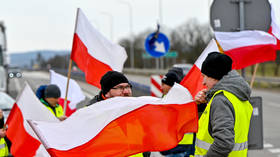Shake-up for Russian fishing industry
Vladimir Putin says it's time to restructure Russia's uncompetitive fishing industry. The President says the country is selling its produce 'dirt cheap' abroad before importing processed fish at inflated prices. Visiting a sturgeon fishery on the Caspain
Astrakhan has been Russia’s fish farm for more than 400 years. Oil is the region’s ‘black gold’, while local caviar is thought of as ‘black pearls’.
Vera Vysokogorskaya has been working in the fish industry for almost twenty years. Her colleagues call her a ‘sturgeon mom’. When Vera is asked about when she last ate caviar, she gives a surprising reply.
“Are you kidding, how can you eat something if you can get a fish out of. For us, caviar is a living creature, every egg of caviar is a little fish,” she said.
The sturgeon hatchery, which is one of the largest in Russia, is working to restore the population of sturgeon in the Caspian Sea.
Beluga fish produce the most expensive kind of caviar. The species has been around for almost 300 million years. Once abundant, now it faces extinction and is rarely found in the wild.
A council to revive Russia’s fishing industry is being held in Astrakhan. Vladimir Putin explained the tasks facing administrators.
“Why do we need this economic zone then? We've announced that these waters are in our economic zone – is it ours? whose is it? We don't have any system of accountability and control over the amount of fishing there or the export of our fish. Exports don't go through customs. We do not even have international agreements with the majority of countries who are consumers of our fish. There are no legal mechanisms for monitoring the fishing boats in this zone. The fishing business in our economic zone is a source of a great number of illegal financial operations and the government will do its best to impose order in this zone,” said the President.
Poaching and ecology are common problems for all marine regions, as well as overfishing. Fishing quotas are often given to the companies, who then go on to resell their catches to foreigners, thus the State has no control over fishing in its own waters. And up to 65% of the Russian catch is controlled by the companies from Hong Kong, Korea and Japan.
The problems of the fishing industry in Astrakhan are far too familiar. The illegal caviar trade is alone thought to worth 1 BLN roubles ($US 39 MLN).
Strict measures are already in place. The state has introduced a complete ban on fishing sturgeon. Confiscated caviar can no longer be sold on as it once was. It’s become one of the ways to fight poaching, the plague of the Caspian Sea.
Every year Astrakhan fish farms release millions of young sturgeon into the Caspian Sea. This year President Putin joined the operation himself. Almost every fish is equipped with an electronic chip, allowing officials to track its movements.











